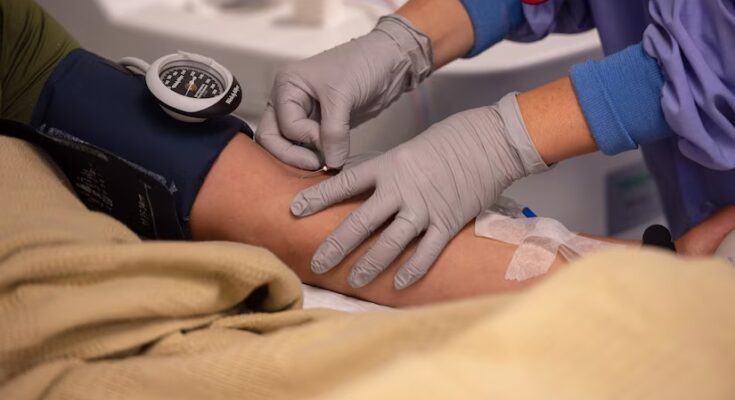Key Takeaways:
- Plasma, the largest component of human blood, carries vital substances and plays a crucial role in maintaining overall health.
- Plasma donation involves separating plasma from other blood components to create life-saving medications.
- Donating plasma can have a significant impact on the lives of patients and may provide financial compensation.
- San Diego has reputable plasma donation centers, such as XYZ Plasma Center and ABC Plasma Center.
- Important factors to consider when choosing a plasma donation center include FDA-approval, donor care, and compensation.
- Scheduling an appointment at a plasma donation center in San Diego is a straightforward process.
- Prior to donation, maintain a balanced diet, stay hydrated, and undergo pre-donation medical screening.
- Tips for a safe and successful donation include being well-rested, wearing comfortable clothing, and remaining calm during the donation process.
- After donation, replenish your body, follow post-donation care guidelines, and consider participating in reward programs and incentives offered by plasma donation centers.
- Plasma donation benefits the community by producing life-saving medications and supporting health and wellness initiatives.
Understanding Plasma Donation
The Science behind Plasma
Plasma, often referred to as the “liquid gold,” is the largest component of human blood, accounting for about 55% of its total volume. It is a yellowish fluid that carries vital substances such as red and white blood cells, platelets, nutrients, hormones, and antibodies throughout the body. Plasma is primarily composed of water, but it also contains proteins, electrolytes, and other important molecules.
Plasma plays a crucial role in maintaining the body’s overall health and functioning. It helps regulate body temperature, transports nutrients to cells, removes waste products, and enables the clotting of blood to prevent excessive bleeding. Additionally, plasma contains antibodies, which are essential for fighting infections and diseases.
How Plasma Donation Works
Plasma donation involves the collection of plasma from individuals who are willing to contribute to lifesaving therapies and treatments. The process is similar to donating blood, but with a slight variation. During a plasma donation, a specialized machine separates plasma from the other blood components, such as red blood cells and platelets. The donor’s blood is drawn through a sterile needle and passed through the machine, which extracts plasma and returns the remaining components back to the donor’s body.
The plasma obtained through donations is then used to create life-saving medications, such as immunoglobulins and clotting factors, which are crucial for individuals with immune deficiencies, bleeding disorders, or other medical conditions. Plasma donations provide a renewable source of these vital treatments and help improve the quality of life for countless individuals.
Advantages of Donating Plasma
There are several compelling reasons to consider becoming a plasma donor. Firstly, donating plasma can have a significant impact on the lives of patients in need. Your plasma donations can be used to develop therapies for individuals with immune deficiencies, hemophilia, and other medical conditions. By donating plasma, you are directly contributing to the well-being of others and potentially saving lives.
Secondly, many plasma donation centers provide compensation to donors for their time and effort. While the specific compensation varies, it is often based on the frequency of donations and the amount of plasma collected. This compensation can serve as a motivating factor for donors, especially those who may be facing financial challenges.
Furthermore, plasma donation centers often provide free health screenings and regular check-ups for donors, which can be beneficial in identifying any underlying health conditions. These centers adhere to strict safety and quality standards to ensure the well-being of both donors and recipients.
Finding a Plasma Donation Center in San Diego
The Leading Plasma Centers in San Diego
San Diego is home to a number of reputable plasma donation centers that provide a safe and welcoming environment for donors. One of the leading centers is XYZ Plasma Center, known for its state-of-the-art facilities and exceptional staff. XYZ Plasma Center has a long-standing reputation for its commitment to donor care and upholding the highest standards of professionalism.
Another highly regarded plasma center in San Diego is ABC Plasma Center. This center is known for its efficient and streamlined donation process, ensuring that donors have a positive experience every time. ABC Plasma Center also offers convenient donation hours and flexible scheduling options to accommodate donors’ busy lives.
What to Look for in a Plasma Donation Center
When choosing a plasma donation in San Diego CA, it is important to consider several factors to ensure a positive and rewarding experience. Firstly, make sure the center is FDA-approved and follows all necessary safety protocols. This ensures that the plasma you donate is processed and used safely for medical purposes.
Additionally, look for a center that prioritizes donor care and comfort. The staff should be knowledgeable, friendly, and experienced in the donation process. The center should also provide a clean and welcoming environment for donors, with modern facilities and amenities.
Moreover, evaluate the compensation packages offered by different centers. While plasma donation is a voluntary act, compensation can help cover expenses and provide a financial incentive for donors. Compare the compensation rates among different centers to find the best option for you.
How to Schedule an Appointment
Scheduling an appointment at a plasma donation center in San Diego is a straightforward process. Most centers provide online appointment booking systems, allowing you to choose a convenient date and time. Simply visit the center’s website, navigate to the appointments section, and follow the instructions to secure your slot.
During the appointment booking process, you may need to provide some personal information, such as your name, contact details, and healthcare history. This information is necessary to ensure your eligibility for donation and facilitate efficient and accurate record-keeping.
Once your appointment is confirmed, be sure to make a note of the date and time. It is advisable to arrive a few minutes early to complete any necessary paperwork and to familiarize yourself with the donation process.
Preparing for Your Donation
What to Eat and Drink Before Donation
Prior to donating plasma, it is essential to properly prepare your body to ensure a successful donation. This includes maintaining a well-balanced diet and staying hydrated. Consuming a healthy meal that includes lean proteins, fruits, vegetables, and whole grains can help replenish your nutrient levels and provide the necessary energy.
Additionally, drinking plenty of fluids, especially water, in the days leading up to your donation is crucial. Staying hydrated helps ensure that your blood flows smoothly, making the donation process more efficient and comfortable.
Pre-Donation Medical Screening
Before each plasma donation, you will undergo a medical screening. This screening helps ensure the safety of both the donor and the recipients of the plasma. During the screening, a healthcare professional will review your medical history, assess your overall health, and perform a simple physical examination.
In some cases, you may be required to provide a blood sample for additional testing. This is done to confirm that you are not carrying any infectious diseases or conditions that may compromise the safety of the plasma supply.
Tips for a Safe and Successful Donation
To ensure a safe and successful donation experience, there are several tips you can follow. Firstly, make sure you are well-rested and feeling healthy on the day of your donation. It is important to get a good night’s sleep and avoid strenuous physical activities before your appointment.
Furthermore, dress in comfortable clothing, preferably with short sleeves or loose-fitting sleeves that can be rolled up easily. This will facilitate easy access to your arm for the donation process.
During the donation, it is important to relax and remain calm. The process typically takes around 45 minutes to an hour. You may experience a slight pinch or sting when the needle is inserted, but the discomfort is usually minimal.
After the donation is complete, follow the guidelines provided by the center for post-donation care. These guidelines may include resting for a short period, consuming a light snack or beverage, and avoiding any strenuous activities for a certain period of time.
Post-Donation Care and Benefits
Replenishing Your Body after Donation
After donating plasma, it is important to replenish your body’s fluids and nutrients. Drink plenty of fluids, especially water, to help your body recover and maintain optimal hydration levels. It is also beneficial to consume a nutritious meal or snack that includes proteins, carbohydrates, and healthy fats to replenish any lost nutrients.
Additionally, be sure to follow any specific guidelines provided by the plasma donation center, such as avoiding alcohol and intense exercise for a certain period of time after donation. These guidelines are designed to support your body’s recovery and maximize the benefits of your donation.
Reward Programs and Incentives for Plasma Donors
Many plasma donation centers offer reward programs and incentives to acknowledge and appreciate the commitment of their donors. These programs often provide points or credits for each successful donation, which donors can accumulate and redeem for various rewards.
Some centers also offer referral programs, where donors can earn additional rewards by referring friends or family members who become new donors. These incentive programs aim to encourage donors to continue their valuable contributions and spread awareness about the importance of plasma donation.
How Plasma Donation Benefits the Community
Plasma donation plays a vital role in supporting the healthcare needs of the community. The plasma obtained through donations is used to produce lifesaving medications and therapies that can improve the quality of life for individuals with various medical conditions.
By donating plasma, you are helping to ensure a continuous supply of these essential treatments for patients in need. You are contributing to advancements in medical research and providing hope for individuals who rely on these medications to manage their conditions and improve their health.
Furthermore, plasma donation centers often collaborate with local communities and organizations to promote health and wellness initiatives. They actively participate in blood drives, health fairs, and other community events to raise awareness about blood and plasma donation, educate the public, and encourage more individuals to get involved.
Overall, plasma donation is a selfless act that has far-reaching benefits. It not only supports individuals in need but also strengthens the healthcare system and builds a stronger and healthier community.




